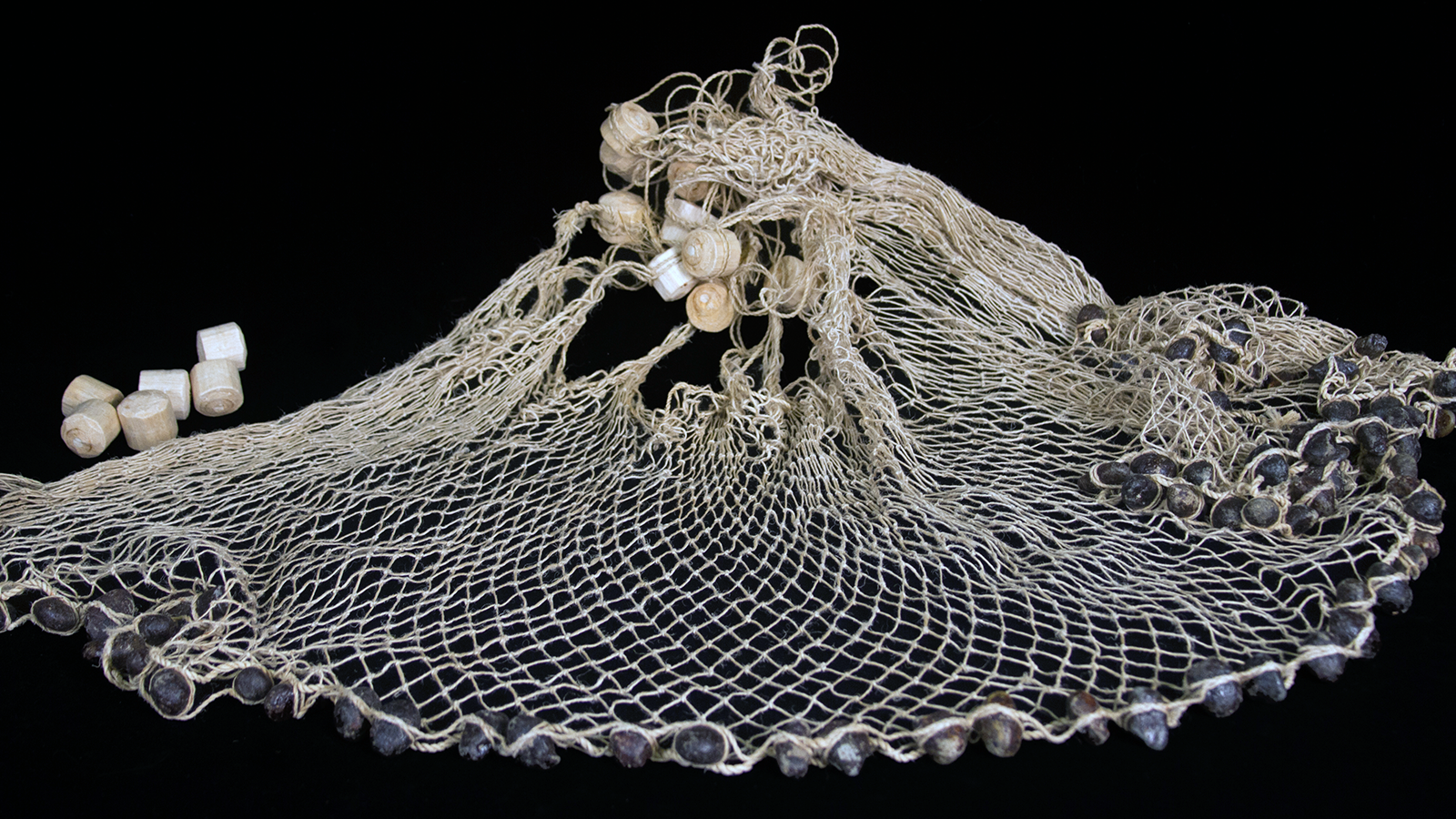K’acha Willaykuna Working Groups | K’acha Willaykuna Llamk’aysikuq Qutu
Join our listserv!
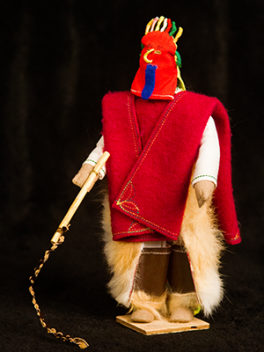
Our Distance Unlearning Hour
Our Distance Unlearning Hour is a virtual development of K’acha Willaykuna’s spring 2020 Our Unlearning Hour and an offshoot of our Autumn 2019 This Decoloniality? Reading Group. Our Distance Unlearning Hour (ODUH) is a weekly Zoom gathering this semester held on Fridays from 1:00PM-2:00pm that is open to all and includes the participation of OSU faculty, undergraduate and graduate students, lecturers and staff as well as international participants, participants from other institutions, members of indigenous communities and artists. You can join us this Spring 2021 semester by going to this link.
This is a space for reflecting on indigenous arts and humanities and for developing exercises of “unlearning” grounded in decolonial approaches, interdisciplinary methodologies, and indigenous meaning-making practices. Check out Our Distance Unlearning Hour recorded sessions on our YouTube channel!
Inspired by the visit of Mapuche artist Sebastián Calfuqueo Aliste in autumn 2019, and in preparation for future K’acha Willaykuna indigenous artist residencies, each week we exchange ideas and reflect together as a community about methods and practices informed by indigenous epistemologies. We use this space to discuss short readings and other media resources shared by members of the K’acha Willaykuna group throughout the semester and to engage artist collaborations. At the end of each hour, we produce a short newsletter with a summary of that morning’s session and links to resources for everyone in the K’acha Willaykuna project. These resources are brief and accessible, supplementing the more research-focused ongoing bibliography for the project.
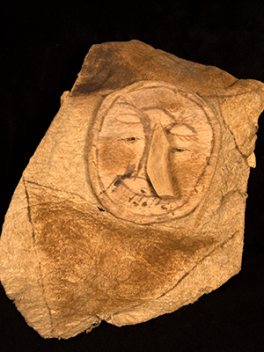
Student Curators: Andean and Amazonian Indigenous Art and Cultural Artifacts Collection
Ohio State’s Andean and Amazonian Indigenous Art and Cultural Artifacts Collection serves as a teaching resource in support of a growing curriculum on Andean and Amazonian Studies while providing graduate and undergraduate student research opportunities and curatorial experience. Supported through National Research Center federal funding for OSU’s Center for Latin American Studies and private donations, this collection is housed as a permanent exhibit in the Department of Spanish and Portuguese (found in Hagerty Hall 255).
Student curators work with items in the collection in a variety of ways. Student-developed digital interactive features created in collaboration with Advanced Computing Center for the Arts and Design (ACCAD) enhance the collection and are featured in our national traveling pop-up exhibit, “The Hidden Life of Things: Andean and Amazonian Cultural Artifacts and the Stories They Tell,” produced with the help of the Center for Languages, Literatures and Cultures (CLLC). Student curators work with visiting artists on the exhibit and its public-facing extensions, co-curate, and reflect in this applied context on important issues of representation, material culture production and museum/exhibit studies. For more information and insight into the work of these curators, please see our Andean and Amazonian Indigenous Art and Cultural Artifacts Collection website.
Michelle Wibbelsman is faculty curator of the collection. Undergraduate student curators past and present include Diego Arellano (2015-2018), Elaine Louden (2019-2020), Jenna Mayeres (2019), Brandon D’Souza (2019-2021), Frances Dillon (2020), Kelly Tobin (2021) Hallie Fried (2021), Micah Unzueta (2021) and Cameron Logar (2021). We have also counted on the support of graduate students Tamryn McDermott, Emily Brokamp, Anna Freeman, Alana Radlo-Dzur and Jessica Pissini. The Whitten Scholarship recognizes the work of our wonderful student curators.
Please email inquiries about classroom uses or undergraduate/graduate research to wibbelsman.1@osu.edu.
(Caption: Tukuna Bark-Cloth Mask made from the inner layer of bark of the sapucaia or Ficus tree and decorated with vegetable-based dyes.)
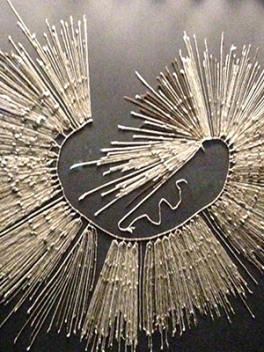
Indigenous Arts and Humanities Legacy Preservation, Knowledge Equity and Digital Footprint Working Group
The K'acha Willaykuna Knowledge Equity Working Group actively explores stewardship of indigenous knowledge works through decolonial information practices.
Through discussions, flash-lectures, hands-on workshops and community projects, the group leads vibrant discussion on decolonial information practices as well as connects the Ohio State community to Andean and Amazonian indigenous knowledge works available through University Libraries’ Rare Books and Manuscripts Library and the Latin American Area Studies library collections.The group actively works to support the preservation of Indigenous knowledge in response to marked knowledge equity gaps of non-Western languages, cultures and histories.
The Knowledge Equity working group is open to all Ohio State librarians, students, faculty, staff and community members. Project collaborators include:
- Eric Johnson | Associate professor and curator, Rare Books and Manuscripts Library
- Pamela Espinosa de los Monteros | Assistant professor, Latin American studies librarian
If you are interested in participating in this working group or for research and teaching inquiries with collections please email Eric J. Johnson (johnson.4156@osu.edu) and Pamela Espinosa de los Monteros (espinosadelosmonteros.1@osu.edu).
(Caption: Inka Khipu (knotted cord) representing coded narrative.)
K-12 Community Engagement Working Group
The Center for Latin American Studies at Ohio State carries out meaningful outreach programs to enhance the public’s knowledge and understanding of Latin America’s politics, business, economics, culture, literature, arts and more. CLAS accomplishes this by supporting teachers from Ohio and beyond through a number of professional development opportunities and resources. In Fall 2020, CLAS released the Teach the Andes K-12 Resource Repository to further incorporate Andean and Amazonian studies into the classroom for K-12 students.
(Caption: Figurine depicting Aya Uma highland festival character. The Aya Uma or “Spirit Head” mask has two faces — one facing forward into the past and the other facing backward into the future.)
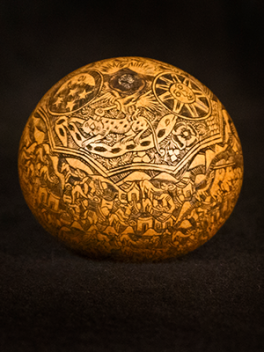
Sumac Puringashpa: Interdisciplinary Virtual Reality Collaboration Working Group
“Sumac Puringashpa – Walking the Meaningful Path: Coming and Going in Andean and Amazonian Worldviews” is a concept-oriented, semi-directed immersion experience in an artistically-rendered virtual reality (VR) environment. The project draws on Indigenous cultural artifacts from Ohio State’s Andean and Amazonian Indigenous Art and Cultural Artifacts Collection, bringing together traditional culture and arts-driven technology with unique opportunities to explore fundamental Indigenous themes, aesthetics and intertextual/multi-modal composition. Click here for a short video and more information on the virtual reality experience.
Project support comes from the Advanced Computing Center for the Arts and Design (ACCAD), The Center for Latin American Studies (CLAS), the GAHDT Collaboration for Humane Technologies and the GAHDT K’acha Willaykuna Andean and Amazonian Indigenous Arts and Humanities Collaboration.
Principal investigators include Associate Professor Alan Price, ACCAD; Associate Professor Michelle Wibbelsman, Department of Spanish and Portuguese; and Professor and Director for Dance and Technology Norah Zuniga Shaw, Department of Dance. Additional collaborators past and present include MFA Abigail Ayers, ACCAD; Assistant Professor Kyoung Lee Swearingen, ACCAD; GRA Leigh Loomis, ACCAD; MFA Lakshika Udakandage, ACCAD; Animation and Motion Capture Specialist Vita Berezina-Blackburn, ACCAD.
If you are interested in participating in a select interdisciplinary student/faculty/staff working group around this project collaboration, please email Michelle Wibbelsman (wibbelsman.1@osu.edu).
(Caption: Andean Etched Story Gourd or calabacita tallada presenting a microcosmic view of Andean mythic and everyday life.)
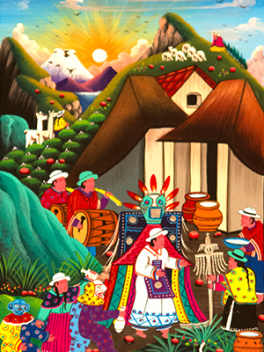
This Decoloniality? Reading Group
Led by Richard Fletcher, associate professor in the Department of Arts Administration, Education and Policy, this reading group was open to interested undergraduate and graduate students, faculty, staff and community partners. The group tackled timely discussions and debates about/from/with decolonial methods and practices as they relate to radical alternatives to modernity and coloniality.
The group met every other week in Autumn 2019. See our calendar and reading list for more information.
(Caption: Tigua “slice of life” painting by artist Juan Luis Cuyo Cuyo depicting an annual festival in Tigua, while other people work in it.)

